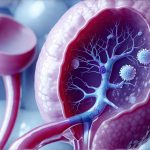Prostatitis, inflammation of the prostate gland, is a surprisingly common condition affecting men of all ages. While often discussed in terms of urinary symptoms, its underlying causes are frequently more complex than initially perceived. Many factors can contribute to prostatitis, ranging from bacterial infections to autoimmune responses and even chronic stress. However, one area that’s gaining increased recognition as potentially significant – yet often overlooked – is the role of vascular health. Understanding how blood flow impacts prostate function is crucial for a comprehensive approach to managing this condition.
This article will explore the intricate connection between vascular health and prostatitis. We’ll delve into how adequate circulation supports prostate gland function, what happens when that circulation is compromised, and potential avenues for supporting healthy blood flow as part of a broader wellness strategy. It’s important to note that this information is intended for educational purposes only and should not be interpreted as medical advice. Consult with a qualified healthcare professional for personalized guidance on your specific health concerns.
The Interplay Between Vascular Health & Prostate Function
The prostate gland requires a robust blood supply to function optimally. This isn’t merely about maintaining structural integrity; it’s vital for its secretory functions, which contribute to seminal fluid production and overall reproductive health. Adequate circulation ensures nutrients are delivered efficiently and metabolic waste products are removed effectively, preventing stagnation that can lead to inflammation and discomfort.
Poor vascular health, whether due to underlying conditions or lifestyle factors, directly impacts the prostate’s ability to function correctly. Reduced blood flow can weaken the gland’s tissues, impair its natural defenses, and potentially contribute to the development or exacerbation of prostatitis symptoms. This connection highlights why addressing vascular issues may be a beneficial component of a comprehensive approach to prostate health.
The Significance of Microcirculation
Microcirculation, specifically within the capillaries surrounding the prostate gland, is particularly important. These tiny blood vessels are responsible for delivering oxygen and nutrients directly to the prostate’s cells. Impaired microcirculation can lead to localized hypoxia (oxygen deficiency) and accumulation of metabolic byproducts, creating an environment conducive to inflammation and pain.
Contributing Factors to Compromised Vascular Health
Several factors can contribute to reduced vascular health and subsequent impact on prostate function. These include established cardiovascular risk factors like hypertension (high blood pressure), hyperlipidemia (high cholesterol), diabetes, and smoking. All these conditions damage the endothelium – the inner lining of blood vessels – hindering their ability to dilate properly and deliver sufficient blood flow.
Sedentary lifestyles also play a significant role. Lack of physical activity leads to reduced circulation and can contribute to the development of vascular disease over time. Even seemingly minor issues like prolonged sitting can restrict blood flow to the pelvic region, potentially impacting prostate health. Chronic stress, while not directly damaging vessels, can constrict blood vessels and reduce overall circulation through increased cortisol levels.
How Vascular Dysfunction Might Manifest in Prostatitis Symptoms
The link between vascular dysfunction and prostatitis isn’t always straightforward, but several symptom patterns suggest a connection. For example, chronic pelvic pain syndrome (CPPS), often categorized as a type of prostatitis, frequently involves muscle tension and nerve sensitivity. Reduced blood flow can exacerbate these issues by limiting oxygen delivery to muscles and nerves, leading to increased pain and discomfort.
Difficulty with urination – a common prostatitis symptom – can also be linked to vascular problems. A weakened prostate due to poor circulation might not contract effectively, hindering proper bladder emptying. Furthermore, inflammation caused by reduced blood flow can irritate the surrounding tissues, contributing to urinary frequency and urgency. The sensation of incomplete bladder emptying is another possible consequence.
Supporting Vascular Health for Prostate Wellness
While more research is needed to fully understand this connection, proactively supporting vascular health may offer benefits for men experiencing prostatitis or seeking preventative measures. Regular exercise, particularly cardiovascular activities like walking, running, swimming, or cycling, improves circulation and strengthens the cardiovascular system.
A heart-healthy diet rich in fruits, vegetables, whole grains, and lean proteins is also crucial. Reducing intake of saturated and trans fats, sodium, and processed foods supports healthy blood vessels. Staying adequately hydrated is essential for maintaining proper blood volume and flow. Additionally, managing stress through techniques like mindfulness, yoga, or meditation can help prevent vascular constriction. These lifestyle adjustments are beneficial not only for prostate health but also for overall well-being.
It’s important to reiterate that this information provides a general understanding of the relationship between vascular health and prostatitis. Individual experiences vary significantly, and professional medical evaluation is essential for accurate diagnosis and personalized treatment plans. A healthcare provider can assess your specific situation, identify any underlying vascular issues, and recommend appropriate interventions. This article intends to empower readers with knowledge about potential contributing factors and proactive steps they can take in collaboration with their healthcare team.





















